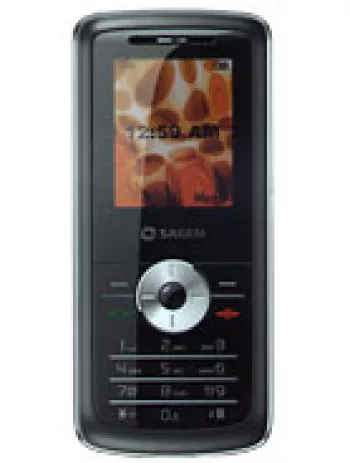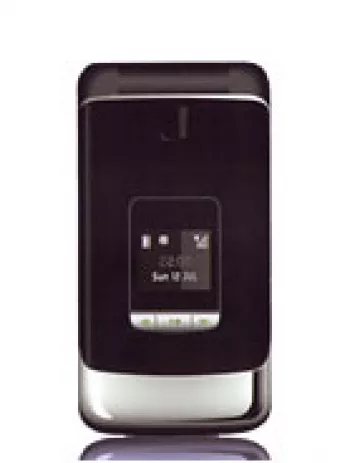
Design and Build Quality
The Sagem my600V features a compact design typical of feature phones from the mid-2000s era. Measuring 110 x 48 x 16 mm and weighing just 100 grams, it was designed for portability and ease of use. The exterior is sleek with a minimalist black finish, aligning with the professional aesthetics of the time. Its dimensions ensure that it fits comfortably in the hand or pocket, making it a practical device for everyday carry.
Display
The device is equipped with a 1.9-inch TFT display, which supports 256K colors, offering a vibrant visual experience for its category. With a resolution of 176 x 220 pixels, the screen offers a pixel density of approximately 148 ppi, sufficient for basic tasks and viewing images. The screen-to-body ratio stands at around 21.5%, which was standard for devices from that period.
Camera Capabilities
The Sagem my600V has a VGA main camera, allowing users to capture basic photos. Although at 0.3MP, the camera is quite limited by today’s standards, it was a useful feature for casual photography and capturing spontaneous moments. It also supports video recording, though the quality is limited. Additionally, the phone includes a CIF videocall camera for simple video calls, reflecting the gradual inclusion of video communication in mobile devices during that era.
Network and Connectivity
The my600V supports both GSM and UMTS technologies, operating on 2G bands (GSM 900/1800) and 3G bands (UMTS 2100). It offers connectivity speeds of up to 384 kbps, enabling basic internet access and mobile browsing via the WAP 2.0/xHTML browser. Bluetooth connectivity is included, allowing for wireless data transfer between devices. However, the phone lacks Wi-Fi, GPS positioning, and has no integrated radio, which could limit its multimedia and navigation capabilities.
Storage and Memory
The device comes with 16MB of internal storage, which is relatively low compared to modern standards. However, it does include a miniSD card slot for memory expansion, accommodating user needs for additional storage. The phonebook can store up to 1000 entries, and call records for 20 dialed, 20 received, and 20 missed calls are maintained, aligning with the typical feature phone requirements of that time.
Battery Life
Powering the Sagem my600V is a removable Li-Ion 1000 mAh battery, ensuring basic endurance for users. The device’s standby time reaches up to 350 hours, with a talk time of about 2 hours and 40 minutes, which was fairly standard in its category. The removable battery design allows users to carry spare batteries, thus extending the phone’s usability on the go.
Audio and Multimedia
In terms of sound capabilities, the my600V does not feature a built-in loudspeaker but supports vibration and downloadable polyphonic ringtones for alerts. The absence of a 3.5mm headphone jack limits the ease of personal audio experiences. The device supports Java MIDP 2.0, which allows for the download and use of simple Java applications and games, enhancing the entertainment options available to users.
Messaging and Internet
The messaging features of the device include SMS, MMS, and Email functionalities, ensuring users could stay connected through various modes of communication. Although the internet browsing capabilities were limited to WAP 2.0/xHTML, it provided basic web access, which was a significant feature for users at the time seeking quick internet interactions.
User Interface and Experience
The user interface is characteristic of classic feature phones, focusing on simplicity and functionality. The navigation is primarily driven through a central navigation key and supporting buttons, all designed for straightforward access to the phone’s features. While lacking the touch capabilities that would later dominate the market, its interface was effective for its time.
Market and Longevity
Announced in October 2006 and now discontinued, the Sagem my600V was part of a transitional phase in mobile phone technology that saw the incorporation of basic multimedia and internet features into traditional cell phone designs. While it lacked the advanced functionalities of modern smartphones, it provided a solid feature set for users at the time looking for a reliable mobile companion.
Conclusion
Overall, the Sagem my600V represents an era of mobile technology where communication devices began converging with multimedia functionalities. Its feature set, designed to meet the needs of mid-2000s users, offered practicality and modest entertainment options. Today, it stands as a reminder of how mobile technology has evolved, highlighting both advancements and the foundational mechanisms from which modern devices were developed.
Main Features of Sagem my600V
- Supports GSM and UMTS technology.
- Lightweight with a compact size (100 g).
- TFT display with 256K colors.
- Expandable storage via miniSD card slot.
- VGA main camera with video recording capability.
- Includes a CIF videocall camera for selfies.
- Bluetooth connectivity available.
- Messaging support for SMS, MMS, and Email.
- Removable 1000 mAh Li-Ion battery.
- Java support with MIDP 2.0.
Disadvantages of Sagem my600V
- Discontinued product, announced in October 2006
- Limited 2G and 3G bands support, only GSM 900/1800 and UMTS 2100
- Small display size of 1.9 inches with a low screen-to-body ratio (~21.5%)
- Low screen resolution of 176 x 220 pixels (~148 ppi density)
- Minimal internal memory of 16MB
- VGA main camera only, with limited image quality
- No loudspeaker feature for hands-free usage
- No 3.5mm headphone jack support
- Lacks WLAN, positioning capabilities, and FM radio
- Proprietary USB connection limits accessory compatibility
- Short talk time of up to 2 hours and 40 minutes
- Limited color option, available only in Black

View Also
More Phones
All Rights Reserved +13916 Phones © Mobilawy 2025

























